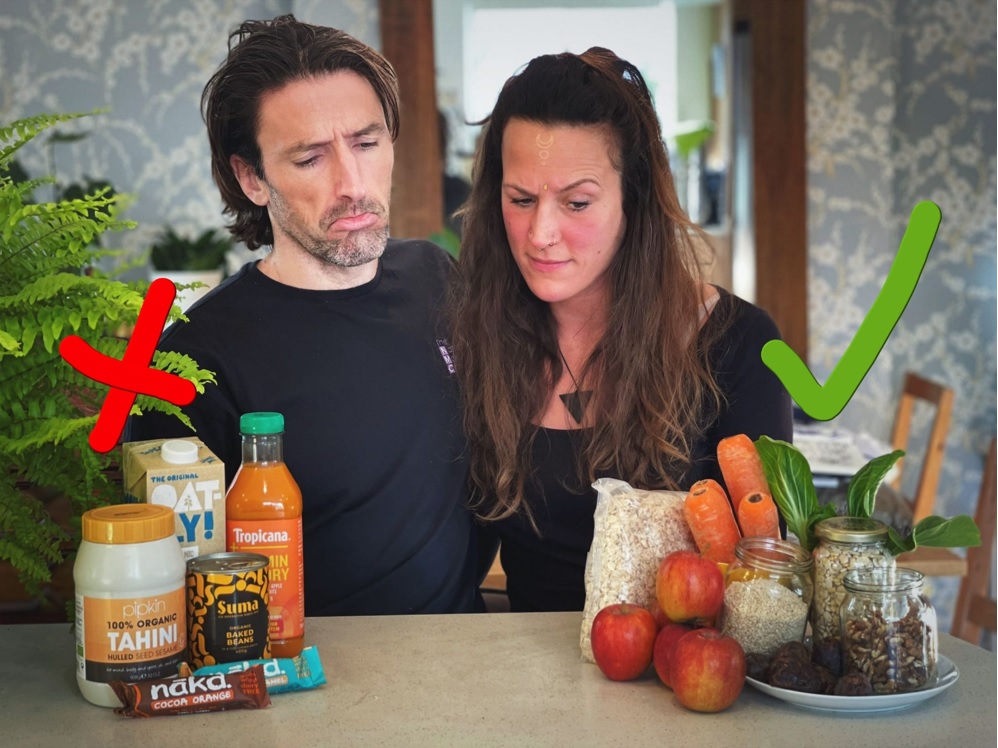Every now and then, foods like chips, crisps and sausage rolls can make a tasty treat, but in the UK, highly processed foods account for nearly 60 percent of our daily energy intake.1 This can have a negative impact on our health. The solution is simple: consume more whole foods. Here, we take a look at 5 benefits of ditching processed products in favour of fresh produce.
1. You decide what goes into your food (and your body)
From salt and sugar to additives like MSG and artificial colourings, highly processed foods often contain excess levels of the types of ingredients we should really keep to a minimum (or even avoid altogether). By buying fresh produce, you decide exactly which ingredients you put into your meals and, just as importantly, which you don’t. By extension, you’re also deciding what food your body uses to fuel and rebuild itself.
2. You choose how your food is prepared
How we prepare our food is really important and can be the difference between a healthy and unhealthy meal. Cooking foods at very high temperatures (think frying and roasting), can not only cause nutrient loss but changes to the structure of the building blocks of foods, such as proteins, carbohydrates and fats. High temperature preparation is common in highly processed products. This includes crisps, crackers, long-life drinks, tinned goods and even seemingly healthy products such as falafel. The fundamental change can interfere with cell division in our own bodies, leading to cell mutations and even cancer.2 By preparing our own food, we can choose to cook ingredients using gentler methods, like boiling or stewing. This ensures we’re eating foods in their healthiest form.
3. It’s easier to maintain a healthier weight
Although highly processed foods are a modern creation, from an evolutionary standpoint, we’re predisposed to eat them, to the point they become addictive.3 Highly processed foods are often rich in extremely calorific ingredients like concentrated fats and sugar. They also contain a lot of salt. These types of components are important for our survival and stimulate parts of the brain that tell us we’re doing something good. While our prehistoric ancestors had to fight tooth and nail to get enough of these ingredients in their diets, today they’re plentiful, which can lead to overconsumption. Fresh produce contains a better balance of components and isn’t so moreish. We’re able to make rational decisions about when we’re full and can avoid over consumption, making it easier to maintain a healthier weight.
4. It gives us a chance to reset bad habits
As a race, humans are creatures of habit and meals are something we do habitually. Habits can be really helpful for us; have you ever driven safely to or from work without recalling the drive itself? Autopilot mode allows us to carry out a function whilst deep in thought on another topic. However, habits can also keep us stuck in patterns of unhelpful behaviour. Saying “no” to our regular favourite products interrupts normal routine and can shed light on our habitual tendencies to reach for foods that feel easy. If we take note, we can reset any bad habits we might have and start to build a healthier relationship with food.
5. It’s cheaper and better value
Buying fresh produce and not paying for the added value of processing can save us money. Not only is the cost of whole foods cheaper, it’s also better value. Because they offer us more nutrients for our money, we end up having to buy less. We can further reduce the cost of our weekly shop by buying foods that are in season.
Is all processed food bad?
It’s worth noting that nearly all foods are processed, at least to some extent. For example, manufacturers process dried beans to make them shelf-stable or frozen veg to ensure longer life. This does not make them less healthy. So, it’s important to understand that foods aren’t unhealthy just because they’re processed in some way.
But highly processed foods, those that contain 5 ingredients or more and share little resemblance to the original foods (think crisps vs. potatoes) are generally unhealthy and don’t offer us optimal levels of nutrients. A good rule of thumb is, if a food doesn’t vaguely look like it did when it was growing in the ground, running around in a field or swimming in the sea, it’s best to avoid it!
Get more health- and wellness-related info
Sign up to my newsletter for more health- and wellness-related information If you found this post interesting, please sign up for my newsletter for more health- and wellness-related information.
References and Sources
- Rauber F, Louzada MLDC, Martinez Steele E, Rezende LFM, Millett C, Monteiro CA, Levy RB. Ultra-processed foods and excessive free sugar intake in the UK: a nationally representative cross-sectional study. BMJ Open. 2019 Oct 28;9(10):e027546. doi: 10.1136/bmjopen-2018-027546. PMID: 31662351; PMCID: PMC6830631.
- Semla, Z., Goc1, M., Martiniaková, R., Omelka, G., Formicki (2017) Physiol. Res. 66: 205-217, (2017) Acrylamide: a Common Food Toxin Related to Physiological Functions and Health.
- Guyenet, S. (2017). The Hungry Brain. UK: Vermillion.



